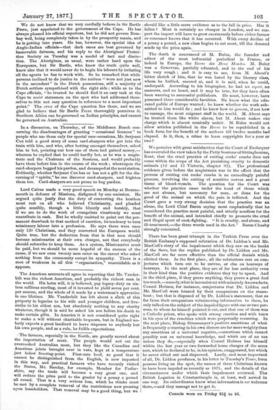There has been great triumph in the Turkish Press over
the British Embassy's supposed refutation of Dr. Liddon's and Mr. MacColl's story of the impalement which they saw on the banks of the Save, but the replies published by Dr. Liddon and Mr.. MacColl are far more effective than the official denials which elicited them. In the first place, all the refutations rest on con- jectures which turn out to be untrue, or else on hearsays of hearsays. In the next place, they are of far less authority even in their kind than the positive evidence they try to upset. And in the third place, if they prove anything, they prove a great deal too much,—namely, what is inconsistent with minutely-known facts. Consul Holmes, for instance, conjectures that Dr. Liddon and Mr. MacColl were hoaxed by their companions on the steam- boat ; but that is disposed of by Dr. Liddon's statement, that so far from their companions volunteering information to them, he only talked on the subject of the impaled figure with one or two per- sons, to whom he himself pointed it out, and that one of them was a Catholic priest, who spoke with strong emotion and with tears in his eyes of the cruelties which were perpetually recurring. In the next place, Bishop Strossmayer's positive assertions of what is frequently occurring in his own diocese are far more weighty than any assertions of a universal negative,—assertions which cannot possibly rest on universal knowledge, and which are of no use unless they do,—especially when Consul Holmes has himself within the last year or two forwarded home charges of the same sort, which he declared to be, in his opinion, exaggerated, but which he never sifted out and disproved. Lastly, and most important of all, Dr. Liddon produces, in his letter to Tuesdays Times, from persons living on the spot, the names of three Christians known to have been impaled as recently as 1875, and the details of the circumstances under which their impalement occurred. The British Legation in Constantinople is, at least, well served in one way. Its subordinates know what information is not welcome there,—and they manage not to get it.


































 Previous page
Previous page